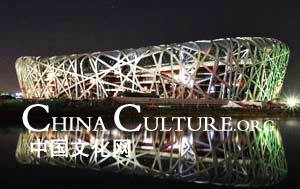Copycat 'Shanzhai' culture takes on life of its own in China
The Chinese word "Shanzhai" literally means small mountain village, but it's now used to describe products that have names similar to famous brands or people who imitate celebrities.
It became an accepted name for fake goods after "Shanzhai Cellphones" produced by small individual workshops in southern China became popular in the mainland market over the past two years.
Besides Shanzhai electronic products, of which there are many, there are "Shanzhai" movies, "Shanzhai" stars and even a "Shanzhai" Spring Festival Gala, a copy of the 25-year-old traditional show presented by CCTV on Chinese Lunar New Year's eve.
|
 |
|
National Stadium and "Shanzhai"-version "Bird's Nest" |
"Shanzhai" has become a culture of its own, symbolizing anything that imitates something famous, the Beijing-based Guangming Daily reported.
The phenomenon has sparked a public controversy over "whether it is healthy or sick being a copycat," according to the newspaper.
In southwestern China's Chongqing Municipality, a "Shanzhai"-version "Bird's Nest" woven by farmers with bamboo attracts wide attention and the "Shanzhai"-version "Water Cube" is popular with tourists, the newspaper said. Both are merely copies of the famous Olympics venues in Beijing.
Shanzhai "represents non-mainstream ideas and innovations, and it's also a new way for common people to express what they want," said Li Zonggui, a professor at Sun Yat-Sen University in south China's Guangdong Province.
Xie Xizhang, a literature critic, said that taking the "Shanzhai" Gala as an example, when the traditional CCTV program became less and less appealing to the audience, the "Shanzhai" version sprang up naturally to attract people for variety.
"Despite its coarse techniques and operation, 'Shanzhai' culture meets the psychological demands of common people and could be a comfort to their minds," Xie said.
Tian Huiqun, a professor at the College of Art and Communication of Beijing Normal University, said the concept of "Shanzhai" started in the business world and thus the "Shanzhai" culture has a commercial aspect.
She said that the "Shanzhai" culture never copies classic things, only trendy products. In that sense, she said, it's like a computer virus, multiplying without meaning.
"If we were too tolerant of such 'culture' ... the culture of [true] innovation would be even harder to develop," she said.
Though controversial, "Shanzhai" culture is becoming a widely accepted phenomenon.
To mainstream culture, the rise of "Shanzhai" culture was a challenge as well as a stimulus, said Xie, according to the newspaper.
Tian said various cultures developing together was an ideal situation and it was for the public to choose, the newspaper said.



















